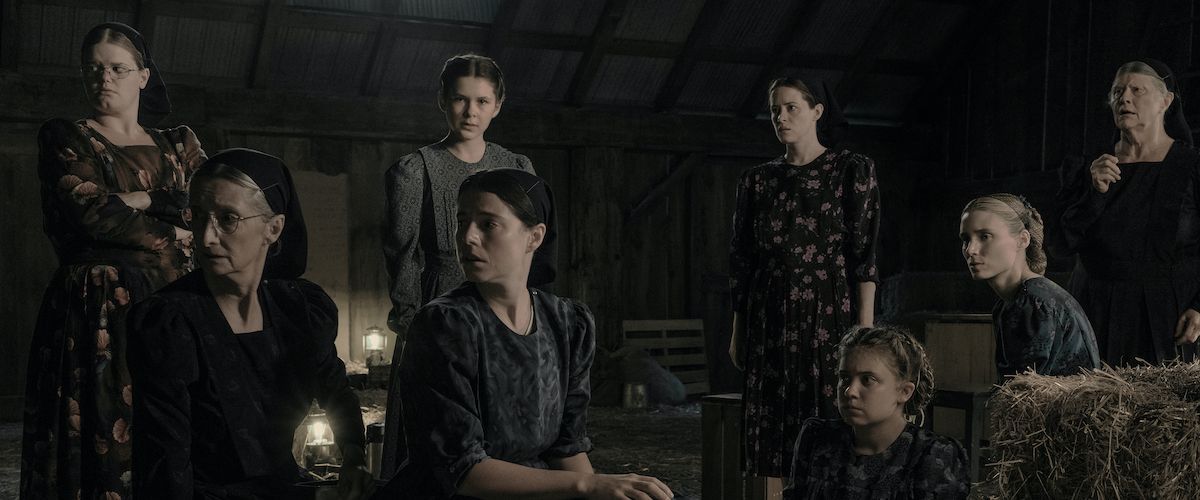Jonah Naplan January 29, 2023
Sexual abuse has seemed to be a major underlying theme during this year’s Oscar race. In Todd Field’s excellent “TÁR,” the title character begins her downfall as allegations start to come out about her being a predator and causing the ultimate suicide of one of her former students. And in “She Said,” two journalists for The New York Times, Jodi Kantor and Megan Twohey, attempt to unravel sexual harassment and rape allegations against Harvey Weinstein. Alas, we have here another such film about this horrifying topic.
In Sarah Polley’s meditative but powerful “Women Talking,” we follow a group of women, all of whom can’t read or write, as they discuss their colony’s next move in the aftermath of an attack on their almost Amish-looking village. To them, there’s only three options. 1) Do nothing. 2) Stay and fight. Or 3) Leave the colony entirely and head elsewhere. The best and most exciting parts of “Women Talking” are when these women—Salome (Claire Foy), Mariche (Jessie Buckley), Ona (Rooney Mara), Mejal (Michelle McLeod), Agata (Judith Ivey), and Greta (Sheila McCarthy)—sit in the hay loft of a barn and dispute amongst each other, as the colony’s school teacher, August (Ben Whishaw), takes the meeting’s minutes in the foreground.
These women are furious and determined. They want some form of vengeance against their oppressors, although many, while still mad, are committed to a non-violent resolution. Above all, these women want to protect their children, born or not yet born, to the end of the Earth, and that issue is what often drives their decision. Ona, for one, was raped and is now pregnant, but August is head-over-heels for her, and wants to take care of her newest son or daughter once they’re born.
“Women Talking” is based on a 2018 novel of the same name, written by Canadian author Miriam Toews, who grew up in a similar Mennonite community in Manitoba. She said that she was inspired to write by the real life story of a secluded colony in Bolivia, where 150 women and children—ages ranging from 5 to 65—were drugged and then raped, waking up the next morning with no clue about what happened. This went on for four years, between 2005 and 2009. The parallels that “Women Talking” has to this story, makes the movie infinitely more important, especially in an age where women’s rights remain in question.
In “Women Talking” the film’s true strength is in the dialogue—hence the title—signifying a story that ends up being more quietly moving than even your average Best Picture nominee. The movie is never pretentious, communicating its ideas through some of the most fleshed out female performances you’ll see in film this year. Mara and Whishaw are particularly endearing as the most genial characters in the film, and in a performance that isn’t nearly given enough leverage, Frances McDormand commands the screen as a woman known as Scarface.
“Women Talking” is a movie that relies on tension, not just among the six women and also two young girls who are present during the meetings (Kate Hallett and Liv McNeil)—but between the entire colony and the looming threat of the rapists that we’re wary will return, but in suspense as to exactly when. We don’t ever see the faces of the rapists, and in the movie they’re only referred to as “the men” or “the attackers.” In fact, I think the word “rape” is only verbally used once or twice. Much of “Women Talking” isn’t about the attack and sexual assaults themselves, rather it’s about a group of headstrong women accepting their plight, and debating what to do about it.
One of the most compelling characters in the film is a transgender man named Melvin—dead name was Nettie—(August Winter) who after being raped and impregnated has been rendered mute from the trauma and only feels comfortable enough to speak around the children. The women do not at first begin to accept this transition, but as the film closes, an almost heartwarming change ensues that I would describe as something that pays off so perfectly. The ending of “Women Talking” is somber, but all the more fitting when we realize its events just had to be so.
Sarah Polley crafts a gorgeously painted landscape acting as a backdrop for the debate. The movie is tinted with such a lush, dark color palette, that it teeters on the verge of black and white. The cinematography from Luc Montpellier and the score by Hildur Guðnadóttir help turn “Women Talking” into a more grounded and sometimes haunting experience that keeps the audience on edge. But although the movie is well-written, much of Polley’s dialogue doesn’t always feel conversational. In a sense, “Women Talking” should fall in line nicely with movies like “12 Angry Men” and “Mass.” By design, the movie is structured much like a stage play, but the way in which these women speak doesn’t entirely seem like the way real people would act in a situation like this. It sometimes feels too calm. There’s not enough yelling over one another. For a few, rage is not palpable.
But some of this could be resolved when realizing that not all characters are equally as mad as one another. Each character is different, all having shared the same traumatic experience, but each reacting to it differently. The way the characters are written therefore allows diversity amongst the discussions. It helps to bring more perspectives into their debate and leads to an ending that is inevitable but depressing. The real powerful core of what makes “Women Talking” work is the rate at which it develops characters through dialogue in the couple days the women sit in the hay loft. And they talk up a storm.
Now available in select theaters.

